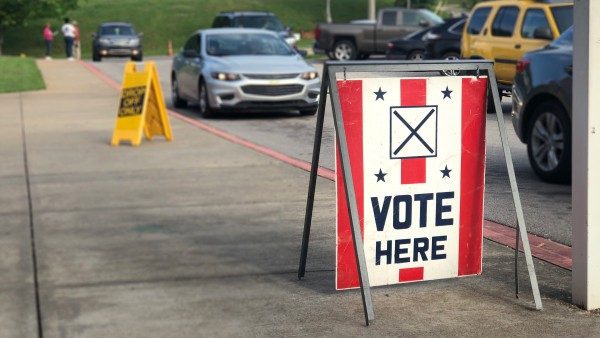Super Tuesday is nearly a week away and hundreds of thousands of Alabama voters are expected to turn out. But according to a new report by the Southern Poverty Law Center, Alabama remains one of the most difficult states for an eligible voter to register and cast a ballot. It’s a claim voting rights activists have made for decades.
On November 6, 2018, former state representative Patricia Todd drove up to her precinct to cast a ballot for the midterm general election.
“I show up to vote that day and of course all the people who work in my precinct know me, and they just died laughing when I walked in,” she says. “I said, what’s so funny? They said you’ve been purged off the voter roll, and I’ve voted in every election.”
Like many voters across the state, Todd was on the inactive list. She says she never received a voter card in the mail, although she’s been an active voter for nearly 25 years. The now vice chair of the Alabama Democratic Party was able to cast a provisional ballot after showing proof of residence. But, she says, most voters aren’t prepared for the hassle if they don’t show up on the voter rolls.
“We need everybody participating in democracy,” she says. “And when you make it difficult for people to do that, we end up where we are now.”
The Southern Poverty Law Center’s report—“Alive & Well: Voter Suppression and Election Mismanagement in Alabama” — highlights what it says are tactics Alabama uses to deter voters, including the photo I.D. law and closing polling places in mostly black counties.
Caren Short is senior staff attorney for the SPLC. She says there are easy fixes, but the state’s chief elections official has shown no interest.
“We don’t have early voting. We don’t have automatic voter registration. We don’t have no-excuse absentee or vote by mail,” she says. “It really is difficult to register and to vote in Alabama.”
Secretary of State John Merrill calls the SPLC’s report “inaccurate” and says voting is easier than ever in Alabama. He says since he took office in 2015, more than a million voters have been added to the active list. But voting rights advocates don’t buy it.
.@alasecofstate @JohnHMerrill misses the point. Our report traces the racist history of voter suppression in #Alabama, which still exists today in the form of voter ID, felony disenfranchisement and polling place closures. https://t.co/bITSq4Ywln
— Southern Poverty Law Center (@splcenter) February 11, 2020
Jenny Carroll is chair of the Alabama State Advisory Committee to the U.S. Commission of Civil Rights. She says a lot of people are still left out of the voting process.
“The state of Alabama has taken the position that it is far more important to be overly protective of the vote rather than to acknowledge that the vote is something that belongs to the citizen,” she says.
Carroll says most voters don’t have the privilege of recognition like Todd, the former state representative. She says because of the inconsistencies in training poll workers, an inactive voter would have to jump through several hoops to vote.
“They have to provide a certificate from the board of registrars office to demonstrate when they originally registered,” she says. “They then have to also provide demonstration of their residency to confirm that they are in fact entitled to vote in the precinct in which they are appearing.”
Carroll says anyone going to the polls next month should be prepared. Aside from your photo I.D., bring proof of residence and your voter registration card just in case.
Attorney Caren Short and her colleagues at the SPLC hope to bring an end to what they call “modern day voter suppression.”
“We’re looking at policies that exist now that have been implemented in the last few years,” she says. “And we’re also looking forward to reforms that could be put in place immediately.”
Those policies include early voting and no-excuse absentee voting.

